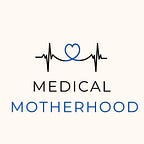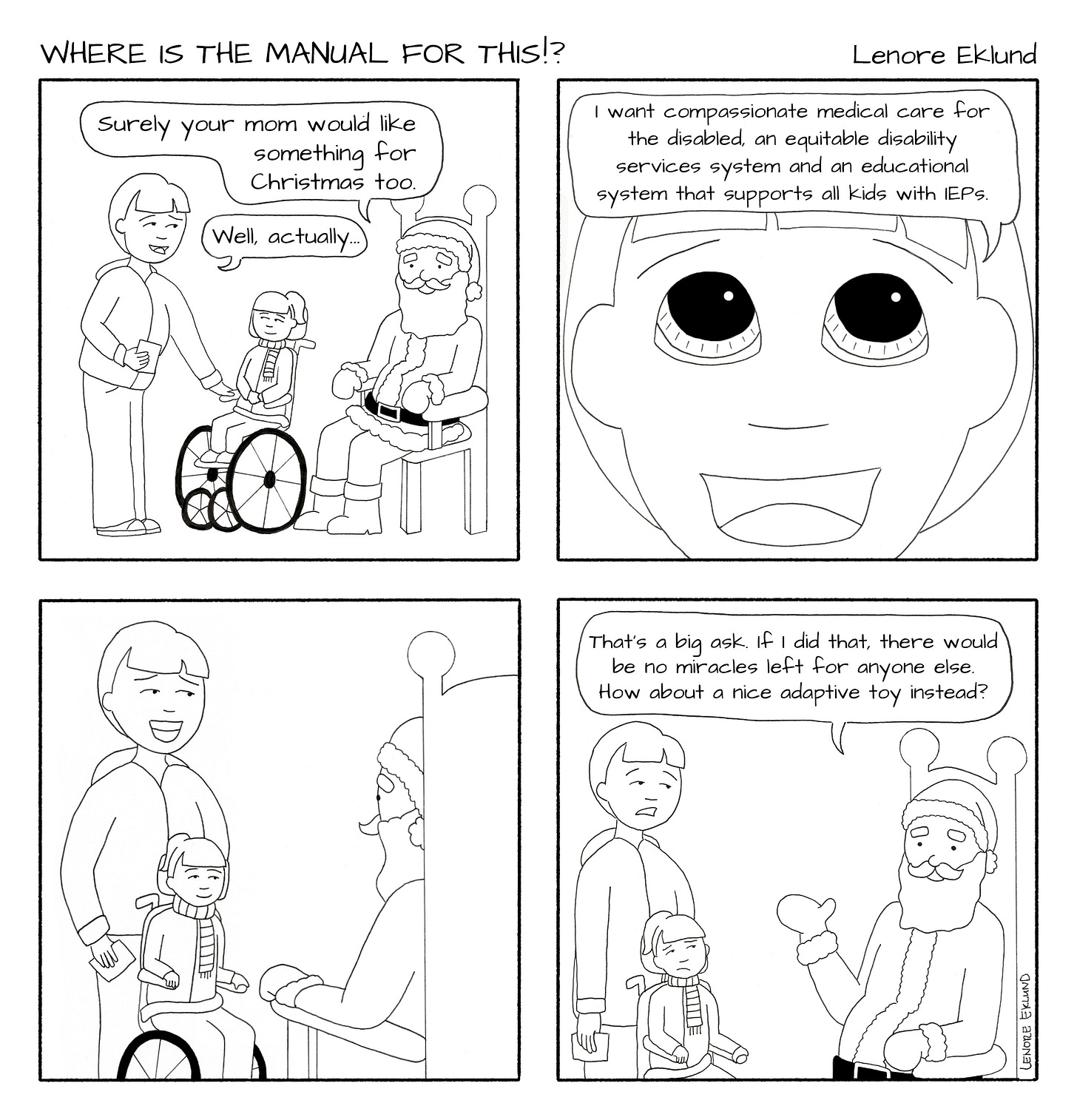The second Sunday of every month Medical Motherhood publishes Where Is the Manual for This?!, an editorial cartoon by Lenore Eklund.
Is it really too much to ask that all these systems set up to help disabled children do what they say they are going to do? We don’t need more toys, we need real change!
What is it that you are hoping for this holiday season for the little ones in your life who experience disability? Let us know in the comments or on social media.
Just a few announcements before we get to the news briefs.
Last week, I brought you the story of Lisa Tschudi in the issue On the cusp of disabled child's adulthood, a mother wonders how caregiver income could have changed their lives. This week, her new podcast Love Doesn’t Pay the Bills published her interview with me. If you want to learn more about my personal journey, check out: Can We Make This Something That We Can Actually Use?: With Guest Shasta Kearns Moore on Spreaker.
Don’t forget that we are running a holiday special right now of 30 percent off paid subscriptions. Support this publication and join the inner circle of folks who get access to the full archive, special behind-the-scenes info and discounted events.
Medical Motherhood’s news round up
Snippets of news and opinion from outlets around the world. Click the links for the full story.
• From the Center for American Progress: “How Dehumanizing Administrative Burdens Harm Disabled People”
For disabled people in America, barriers to critical, lifesaving safety net programs are too often a part of everyday life. These barriers, known as “administrative burdens,” are roughly defined as any challenge that makes it difficult for someone to access or maintain assistance for which they otherwise qualify.2 Administrative burdens cause real, lasting harm to huge swaths of disabled Americans, making it difficult for them to navigate a system that is supposed to help them cover basic necessities such as food, housing, and medical treatments.
[The report contains 17 different recommendations for shifting administrative burdens from disabled people and their families to the government and program administrators.…]
Just as it is expensive to be poor, it is expensive to be disabled. Households with disabled adults need 28 percent more income, on average, to achieve the same standard of living as adults without a disability. Moreover, the added costs of medicines and medical procedures, accessibility accommodations in homes and transportation, and many other regular expenses are exacerbated by the fact that disabled workers—if they are able to work and are employed—earn just 74 cents for every dollar earned by their nondisabled counterparts; Black and Hispanic disabled workers, in particular, earn 60 and 61 cents, respectively, for every dollar earned by nondisabled, full-time white workers. The extra cost of living for disabled people is often referred to as the “disability tax.”
Administrative burdens within programs intended to help people with disabilities add another dimension to the disability tax, often financially but also through additional drains on disabled people’s time, energy, and physical and mental well-being.
[…]On top of negatively affecting applicants and participants, administrative burdens are detrimental to program administrators. Burdens pull administrators away from providing people with helpful and personalized assistance and instead leave them to comb through voluminous amounts of paperwork and to adjudicate minute filing deficiencies.27 Government workers should have rewarding jobs providing aid to those who need it most, but they are often left overwhelmed, which, sadly, can translate into negative experiences for people seeking assistance. […]
• From Disability Scoop: “Pediatricians Get New Guidance On Cerebral Palsy”
A pair of major health organizations are issuing new guidance to doctors about how to identify children with cerebral palsy and appropriately treat the condition.
In a clinical report and an executive summary published online this month in the journal Pediatrics, the American Academy of Pediatrics and the American Academy for Cerebral Palsy and Developmental Medicine said it’s critical for kids to be screened and identified early to ensure the best outcomes.
[…] If kids with the developmental disability experience new symptoms or functional declines, physicians should fully investigate the changes without assuming that they are the result of cerebral palsy, the medical groups said.
“It really does ‘take a village’ to help children with CP reach their full potential,” said Dr. Garey Noritz, lead author of the report and chairperson of the American Academy of Pediatrics Council on Children With Disabilities. “Families and physicians share this goal and can partner to improve quality of life by focusing on the strengths of the child and family, providing appropriate services and adapting the environment to the needs of each child.”
• From The Oregonian/OregonLive: “Oregon students with disabilities were promised extra help post-pandemic, but 15 months later, aid is limited”
Oregon public schools enroll about 80,000 students with disabilities, many of whom struggled mightily during the year-plus-long switch to online school.
As a result, state and federal officials ordered the state’s 197 school districts to provide intensive make-up services to special education students who missed out on help such as speech therapy or one-on-one reading instruction to which they were legally entitled during the pandemic. They also directed schools to ensure catch-up by June 2023 for students on individual education plans who made little to no progress during online school.
But parents, teachers and advocates say that stretched-thin school districts are struggling to provide the promised services, given severe staffing shortages.
“It takes all [my] mind, body and soul to get what [the district] is legally obligated to give my child,” said Korallynn Basham, whose 8-year-old daughter Clara, a second grader at Creston Elementary School, has a rare genetic development disorder known as Williams-Beuren syndrome.
The requirement that schools provided amped up special education services only applies to last school year and this one, and a spokesperson said the Oregon Department of Education does not anticipate extending it, even if children with disabilities remain far off track or didn’t receive any extra help. […]
Medical Motherhood brings you quality news and information each Sunday for raising disabled and neurodivergent children. Get it delivered to your inbox each week or give a gift subscription. Subscriptions are free, with optional tiers of support. Thank you to our paid subscribers!
Follow Medical Motherhood on Facebook, Twitter, TikTok, Instagram or Pinterest. The podcast is also available in your feeds on Spotify and Apple Podcasts. Visit the Medical Motherhood merchandise store.
Do you have a story to share or an injustice that needs investigation? Tell me about it and it may become a future issue.













